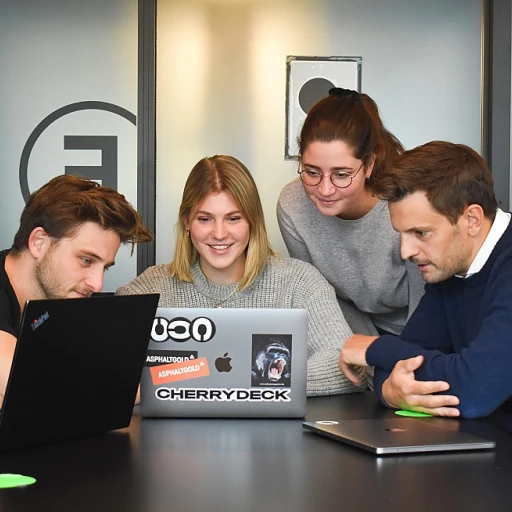Understanding Project Management Domains
Grasping the Essentials of Project Management
Project management is increasingly recognized as a multifaceted discipline that requires a deep understanding of various domains. These knowledge areas encompass the core activities involved in guiding a project towards its objectives, ensuring that project managers and their teams can navigate effectively through complex projects.
A successful project commences with a clear development approach that aligns with the organization’s overall strategy. This initial step involves establishing a robust project team, which is critical to enhancing team performance and achieving the desired outcomes. Understanding the importance of team culture is key, as it directly influences the team dynamics and, ultimately, the project’s success.
Each domain within the project management framework, as outlined in resources like the PMBOK guide, illuminates areas such as risk management and stakeholder engagement. Mastery of these domains allows project teams to anticipate and mitigate potential risks, while also maintaining a focus on the effective leadership required to drive team development and project performance forward.
The PMP exam rigorously evaluates a project manager's capability in these domains, emphasizing the importance of having a thorough understanding of the performance domains, which are integral to effective project management. Moreover, new editions of the PMBOK guide regularly update practitioners with fresh insights and principles to enhance their capabilities in this ever-evolving field.
A comprehensive grasp of these foundational elements feeds into greater adaptability in the face of technological advancements and evolving work environments. It lays the groundwork for exploring more advanced methodologies and skills that prepare project managers for a future defined by change and diversity.
Adapting to Technological Advancements
Embracing Technological Shifts in Project Management
The practice of project management is undergoing a significant transformation due to technological advancements. This evolution requires project managers to continuously update their knowledge in order to enhance project performance. The PMI's PMBOK Guide outlines essential knowledge areas that guide professionals through the complexities introduced by new technologies. The effectiveness of project management in today's digital age heavily relies on mastering these knowledge domains. Technology impacts every aspect of project work, from risk management to team development. To effectively harness technology, project teams must ensure that their tools and methodologies align with their objectives, enabling seamless performance within their respective domains. Incorporating the latest technologies involves adapting to advanced project management software and tools, which facilitate project tracking, collaboration, and reporting. Technologies such as artificial intelligence and machine learning can optimize resource allocation and risk management, thereby improving team performance and project outcomes effectively. Successful implementation of these tools necessitates an understanding of both the technological landscape and the nuances of each project domain. Moreover, technological advancements influence the development approach by providing opportunities for innovation in leadership and team culture. Effective project managers recognize the strategic importance of leveraging technology, and they cultivate an agile mindset within their teams. They guide team members through the adoption of new tools, ensuring cohesive execution of project activities. For professionals preparing for the PMP exam, it's crucial to familiarize themselves with the digital trends affecting project management domains. Staying informed about the latest editions of relevant guides and standards is imperative for maintaining a competitive edge. To delve deeper into navigating project management in a future-driven environment, consider exploring this insightful comparison of tools that shape tomorrow's work. Understanding these tools will enhance both your leadership skills and the overall performance of your project teams.Remote and Hybrid Team Dynamics
The Transition to Remote and Hybrid Work Models
In today's fast-evolving work environments, the transition to remote and hybrid work models presents new challenges and opportunities for project teams. As organizations adjust to these models, the role of project management is more critical than ever in ensuring effective team performance and achieving project objectives. Here we explore the dynamics of working remotely and in hybrid settings, highlighting key strategies for success. Remote and hybrid work demand a reevaluation of team culture and communication practices. Project managers play a vital role in facilitating seamless communication among team members who might be scattered across various locations. Creating a robust communication framework is essential to maintain engagement and collaboration across different performance domains of a project. Remote work does not only alter communication, it also impacts project development approaches. Adopting digital tools and platforms that support virtual collaboration is crucial. These tools aid in setting clear project objectives and tracking progress, contributing to overall team performance. An effective project management strategy takes into account the diversity of team members’ time zones and cultures, as well as potential risks to cohesive collaboration. Moreover, understanding the nuances of remote risk management is imperative. With team members working in disparate locations, identifying and mitigating risks early in the project life cycle becomes a priority. By utilizing comprehensive knowledge areas from standards like the PMBOK guide, project managers can ensure the alignment of stakeholders and manage potential issues effectively. Finally, leadership within project management must navigate personality dynamics in these geographically dispersed teams. Fostering a strong virtual team culture enhances productivity and empowers team members, promoting a sense of unity and purpose. As highlighted by experts in the field, incorporating flexibility in work arrangements significantly influences team morale and can be explored further through insights on how flexibility shapes our work lives. In conclusion, adapting to remote and hybrid work models involves more than incorporating new technologies. It requires a comprehensive understanding of project management domains, effective communication, and a strategic focus on team development to drive project performance.Cultural and Generational Diversity
Fostering a Cohesive and Inclusive Team Culture
With the shifting landscape of work, today's project teams are becoming increasingly diverse. This diversity spans across cultural backgrounds and generational differences, which can bring a wealth of perspectives but also introduce challenges in project management. Understanding and respecting these differences is crucial to effective project performance and leadership.
When managing a diverse group, it's important to tailor an approach that acknowledges the varied experiences and skills that each team member brings to the table. Project managers need to develop a deep understanding of the performance domains and knowledge areas within the PMBOK Guide to manage these dynamics efficiently. This can help in navigating the complex life cycle of projects by balancing team objectives with individual strengths.
One of the key principles in ensuring effective project and team performance is fostering an inclusive team culture. Encouraging open dialogue and collaboration among team members can improve both the team's performance and project outcomes. This also involves recognizing and overcoming biases that may affect team dynamics, thereby reducing risk and enhancing project management.
In addition to promoting inclusivity, it's essential to focus on team development activities that reinforce the collective vision of the project. This could involve mentorship programs, cultural competency training, or tailored leadership workshops aimed at boosting team engagement and cohesion. By embracing these strategies, project managers can better align their teams with the project's objectives and improve overall performance.
Moreover, effective risk management is a cornerstone of managing diverse and multi-generational teams. Projects stand a better chance of success when potential hurdles are forecasted and addressed proactively, based on insights from the project's performance domain. This requires project managers to be adept in various domains of development approaches and incorporate flexibility into their leadership styles to adapt to the unique needs of their teams.
Agile Methodologies in Modern Project Management
Embracing the Agile Philosophy
Project management has seen a significant shift with the integration of Agile methodologies—an approach celebrated for its flexibility and responsiveness. This methodology provides a framework that aligns well with the changing dynamics of modern work environments. Professionals across various project management domains have found that Agile principles enhance not only team performance but also the ability to deliver effective project outcomes.
The PMBOK Guide outlines essential knowledge areas that, when combined with Agile's iterative development approach, can assist in fostering team culture that thrives in unpredictability. Agile methodologies emphasize collaboration and adaptability, key attributes that are crucial when managing the complexities of cultural and generational diversity within project teams. By focusing on these principles, project managers are equipped to steer teams towards meeting project objectives, even when faced with uncertainty.
Maximizing Team Relationships and Performance
One of the foremost benefits of Agile methodologies is enhancement in project team management. This approach supports the engagement of team members by promoting transparent communication and close collaboration with stakeholders. As the roles of traditional command-and-control leadership evolve, the need for project managers to cultivate a participative style becomes apparent. It’s about empowering team members to take an active role in the life cycle of projects.
Through continuous development and feedback loops, performance domains within project management are meticulously addressed, ensuring project teams can adjust swiftly to changes and risks as they arise. This agility is indispensable, especially in remote and hybrid work settings, where maintaining alignment and momentum among dispersed team members can be particularly challenging.
Risk Management in Agile Environments
The dynamism of Agile also extends to risk management practices. In this context, the ability to promptly identify and manage risks is critical to maintaining project performance and achieving desired outcomes. Agile frameworks prioritize proactive risk management, integrating it into their continuous improvement cycles.
For project managers preparing for the PMP exam, understanding these intricate Agile processes and their integration with traditional knowledge areas will be imperative. The latest edition of the PMBOK Guide offers insights into navigating these concepts effectively, ensuring leaders are well-equipped to guide their teams through the intricacies of modern work environments.
Future Skills for Project Managers
Essential Skills for Tomorrow’s Project Managers
To effectively lead project teams into the future, project managers need to develop a versatile skill set that not only covers traditional project management domains but also adapts to the ever-evolving work environment. These competencies are informed by the necessity to harmonize technology, manage diverse teams, and implement agile methodologies.- Risk Management Acumen: In an era where changes are rapid and disruptions frequent, project managers must excel in risk management. They need to assess potential threats and implement mitigation strategies to ensure project objectives are met despite uncertainties.
- Technological Proficiency: As our section on adapting to technological advancements highlights, managers must embrace new tools and platforms to streamline activities. Familiarity with the latest project management software and the ability to integrate these tools into everyday tasks is crucial.
- Leadership and People Skills: Project teams are more culturally and generationally diverse than ever. Effective leadership involves understanding team dynamics and fostering a positive team culture that enhances performance and aligns with broader management principles.
- Agile Methodology Expertise: As agile methodologies become more prevalent, understanding agile frameworks like Scrum and Kanban is essential. This knowledge allows for flexible project strategies and swift adaptation to change, which are vital for maintaining project performance.
- Knowledge of PMBOK and PMP Exam: Staying updated with the latest PMBOK guide and PMP exam standards is crucial. These resources provide a solid foundation of project management principles and effective project strategies, ensuring adaptability across various performance domains.
- Effective Communication Skills: Whether in remote or hybrid settings, project managers must communicate clearly with team members and stakeholders. This skill ensures alignment on project objectives across all stages of the project life cycle.












